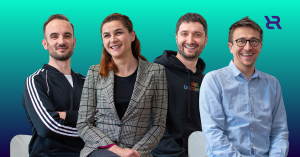Before founding Omnio, Stoyan Lozanov spent years in the corporate world, working with banks and financial institutions, experiencing the inefficiencies and bureaucracy firsthand. Compliance and risk teams lacked a unified system, unlike sales and marketing teams with tools like Salesforce and Hubspot. Driven by this gap, Stoyan founded Omnio—a holistic platform to streamline compliance by consolidating multiple systems into one, empowering teams to focus on safeguarding financial institutions. Though based in Bulgaria, Omnio serves fintechs, banks, and trusts across Europe, America, and Asia-Pacific The solution is tailored to the needs of different markets, including governmental agencies and other regulated financial institutions.
In this interview, Stoyan discusses the company’s journey, its future in the RegTech space, and plans to reach unicorn status by 2027-2028.
Omnio plans to become a “Unicorn” in the RegTech space. What specific strategies are you using to achieve this goal in such a competitive global market?
As an Eastern European company, in a region not famous for strong financial fraud prevention, we had to be creative in building our business. Omnio focuses on expansion beyond traditional marketing. To attract clients in the U.S., Singapore, and South Africa, we developed a partner strategy, collaborating with risk and compliance management partners worldwide. Instead of heavy marketing spending, we offer affiliate referrals, resulting in organic growth.
Another strategy is expanding within financial groups. We often enter a group via one company, such as a fintech, and then serve others within the same network, like lending or retail banking.
Finally, we’re targeting venture capital funding to enhance our software and grow, including opening offices in two additional countries across different continents.
We aim to become a RegTech Unicorn by 2027/2028, capitalizing on market consolidation. As larger players focus on acquisitions, Omnio sees an opportunity for startups like ours, who don’t seek acquisition, to stand out. Unicorn status in this niche is achievable with a handful of major clients, given the long sales cycles and need for proprietary software. By adopting best practices and staying close to prospects and partners, we believe we are poised for significant growth.
Your client base spans Europe, America, and Asia with notable operations in Singapore and Australia. What challenges have you faced while entering new international markets?
We’re currently opening offices in two countries on different continents as part of our expansion strategy. Since we’ve positioned ourselves well in both Asia and the Americas, it’s the right time to establish a stronger presence there. Selling robust risk management software requires building trust in person. Meeting clients face-to-face helps them feel confident, which is crucial in financial fraud prevention. While some competitors excel in sales due to their local presence, we focus on being where we need to be.
My biggest personal challenge has been managing time zones—serving clients in Singapore and Australia early, and U.S. clients late. For the company, maintaining 24/7 service is key, as our support teams must always be available to provide critical services.
Generative AI and ML are pivotal to your future plans. How are they enhancing Omnio’s capabilities, and what breakthrough innovations can we expect in the future?
I’ve described Omnio as the Mona Lisa of RegTech software – a state-of-the-art proprietary RegTech platform., I’m excited to share that we’re working on breakthrough innovations in corporate diligence, anti-money laundering, and banking, leveraging partnerships with LLM systems, Generative AI, and our proprietary algorithms. We’re constantly doing R&D, with the ambitious goal of fully automating processes in this sphere—if it’s legally feasible—removing the human factor entirely.
However, we didn’t start with Generative AI because sometimes it acts like a black box, which isn’t always useful for our clients. First, we built a proprietary system with solid logic and workflows, and then carefully integrated Generative AI where it makes sense, ensuring it delivers accurate and context-driven results.
With the rapid evolution of compliance requirements, how does Omnio ensure its platform stays ahead in adapting to new regulations?
As a software provider, we enable financial institutions to implement their preventive mechanisms, following the regulations approved by their local authorities. Customers have full control over their workflows and can quickly update processes when new regulations arise. While Omnio provides a sample set of rules, it’s the client’s responsibility to update their compliance programs and create specific procedures that align with their regulatory needs.
How do you see your technology contributing to broader societal goals, such as combating global organized crime?
At Omnio we contribute to combating global organized crime by providing software that minimizes human error in identifying financial fraud. By effectively targeting the shadow economy, we disrupt the financial resources that fuel organized crime. When we cut off these resources, we weaken criminal organizations, reducing their ability to operate.
This principle also applies to terrorism; financial power drives both organized crime and terrorism. By eliminating the gray economy and ensuring adequate taxation, we enable states to invest more in infrastructure and social programs, such as education. Ultimately, our software helps pave the way for a better future by enhancing compliance and reducing opportunities for crime.
What were the most critical lessons you’ve learned along the way, and how have they shaped Omnio’s approach today?
I consider myself lucky for the lessons I’ve learned along the way. I’ve made nearly every mistake possible, but those experiences have built my confidence through logic, knowledge, and a positive mindset. I’ve faced challenges with co-founders, funding issues, and the struggle to find the right team members who share the vision. I’ve dealt with difficult customers—those who refuse to pay and those who want more than what we provide.
These experiences have shaped Omnio into what it is today. Now, we prioritize emotional intelligence within our team over just focusing on business metrics. This shift allows us to harness the brilliant ideas of my colleagues. We have a new generation of Omnio leaders who understand that difficulty and error are opportunities for growth rather than setbacks. While technology like artificial intelligence can innovate, it’s ultimately people who drive success. There’s no point where natural intelligence becomes artificial and vice versa; they must work hand in hand.








